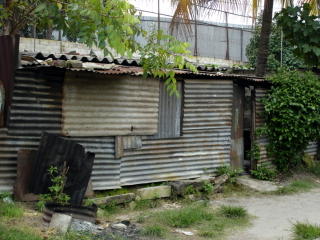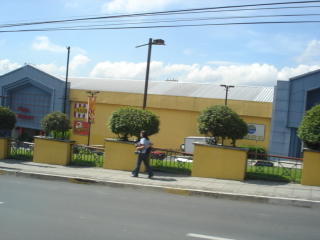EL SALVADOR TRIP DAY 1 #1 (8 23 05)
From my journal. My first thoughts upon arriving in San Salvador, capital of El Salvador, on my trip to observe Compassion International:
SAN SALVADOR:
McDonalds. Shopping malls. Sherwin Williams. This looks like North America. This looks like a place blossoming with the fruits of capitalism and democracy. And it is.
Prostitutes. Broken glassed storefronts, graffiti. A passed out bearded man on a sidewalk. This looks like North America too. This looks like a place choked by the weeds of selfishness and politics. And it is.
 San Salvador, Central America perhaps, is just North America fast forwarded or under a magnifying glass. The disparity between the haves and have nots is here in different proportions, in exaggerated contrast. The living and the dying share the smallest nation in Central America, splitting it in half. Fifty percent of El Salvador’s people are impoverished, living on less than the equivalent of $1 a day. The other fifty percent have more. They are living somewhere between getting by and luxury.
San Salvador, Central America perhaps, is just North America fast forwarded or under a magnifying glass. The disparity between the haves and have nots is here in different proportions, in exaggerated contrast. The living and the dying share the smallest nation in Central America, splitting it in half. Fifty percent of El Salvador’s people are impoverished, living on less than the equivalent of $1 a day. The other fifty percent have more. They are living somewhere between getting by and luxury.
And that is what makes the Americas so much more frustrating to me than some other impoverished nations. In parts of Africa exist tribes in which poverty is the norm. There is no wealth, no getting by, no other kind of life within view to compare oneself too. There is no hope down the street. No one to plead with, no neighbor to help. It is easy in such places to believe that such a neighbor, one that was blessed with more, would share if he only existed. And maybe he does in some far away land. Maybe he’ll arrive on an airplane and save us – they might wonder.
 But in the Americas the neighbors with more than enough exist in abundance and every poor person knows it. I was slapped today by this realization that in the Americas help IS down the road and needn’t arrive from a far away place by plane. If only the houses we passed on the way to the Compassion International projects today would look beyond their own front doors. If only the patrons of the malls and fast food chains and home improvement stores would keep just enough and spend the rest on fighting poverty next door. If North Americans would look at their daughter’s dance costume as three Salvadorans that could be saved, at their new stereo as six stomachs that could be filled, at a church sound system as ten thousand bodies clothed, fed and revived by the love of God – If only.
But in the Americas the neighbors with more than enough exist in abundance and every poor person knows it. I was slapped today by this realization that in the Americas help IS down the road and needn’t arrive from a far away place by plane. If only the houses we passed on the way to the Compassion International projects today would look beyond their own front doors. If only the patrons of the malls and fast food chains and home improvement stores would keep just enough and spend the rest on fighting poverty next door. If North Americans would look at their daughter’s dance costume as three Salvadorans that could be saved, at their new stereo as six stomachs that could be filled, at a church sound system as ten thousand bodies clothed, fed and revived by the love of God – If only.
If only the Church, in every nation it lives in, would stop and stoop and dress the wounds of it’s own members and then it’s own countrymen and then those beyond it’s borders.
If only I could do this. Only enough. But what does that look like?
SAN SALVADOR:
McDonalds. Shopping malls. Sherwin Williams. This looks like North America. This looks like a place blossoming with the fruits of capitalism and democracy. And it is.
Prostitutes. Broken glassed storefronts, graffiti. A passed out bearded man on a sidewalk. This looks like North America too. This looks like a place choked by the weeds of selfishness and politics. And it is.
 San Salvador, Central America perhaps, is just North America fast forwarded or under a magnifying glass. The disparity between the haves and have nots is here in different proportions, in exaggerated contrast. The living and the dying share the smallest nation in Central America, splitting it in half. Fifty percent of El Salvador’s people are impoverished, living on less than the equivalent of $1 a day. The other fifty percent have more. They are living somewhere between getting by and luxury.
San Salvador, Central America perhaps, is just North America fast forwarded or under a magnifying glass. The disparity between the haves and have nots is here in different proportions, in exaggerated contrast. The living and the dying share the smallest nation in Central America, splitting it in half. Fifty percent of El Salvador’s people are impoverished, living on less than the equivalent of $1 a day. The other fifty percent have more. They are living somewhere between getting by and luxury.And that is what makes the Americas so much more frustrating to me than some other impoverished nations. In parts of Africa exist tribes in which poverty is the norm. There is no wealth, no getting by, no other kind of life within view to compare oneself too. There is no hope down the street. No one to plead with, no neighbor to help. It is easy in such places to believe that such a neighbor, one that was blessed with more, would share if he only existed. And maybe he does in some far away land. Maybe he’ll arrive on an airplane and save us – they might wonder.
 But in the Americas the neighbors with more than enough exist in abundance and every poor person knows it. I was slapped today by this realization that in the Americas help IS down the road and needn’t arrive from a far away place by plane. If only the houses we passed on the way to the Compassion International projects today would look beyond their own front doors. If only the patrons of the malls and fast food chains and home improvement stores would keep just enough and spend the rest on fighting poverty next door. If North Americans would look at their daughter’s dance costume as three Salvadorans that could be saved, at their new stereo as six stomachs that could be filled, at a church sound system as ten thousand bodies clothed, fed and revived by the love of God – If only.
But in the Americas the neighbors with more than enough exist in abundance and every poor person knows it. I was slapped today by this realization that in the Americas help IS down the road and needn’t arrive from a far away place by plane. If only the houses we passed on the way to the Compassion International projects today would look beyond their own front doors. If only the patrons of the malls and fast food chains and home improvement stores would keep just enough and spend the rest on fighting poverty next door. If North Americans would look at their daughter’s dance costume as three Salvadorans that could be saved, at their new stereo as six stomachs that could be filled, at a church sound system as ten thousand bodies clothed, fed and revived by the love of God – If only.If only the Church, in every nation it lives in, would stop and stoop and dress the wounds of it’s own members and then it’s own countrymen and then those beyond it’s borders.
If only I could do this. Only enough. But what does that look like?










7 Comments:
Shaun, I loved reading your experience and your thoughts on encountering poverty. It challenges me to think about the things you wrote about. In considering the misfortunes of others, I find that 1.) my needs and problems are not nearly as big as I like to think they are, and 2.) I have a long way to grow until I can see those in need as more valuable than feeding myself another meal at taco bell or buying another polo shirt. Thanks for the challenge.
I have to admit that I've not really heard much of your music, Shaun, but I've become a big fan of yours through your writing. And I think you're on to something. I empathize with your desire to see the playing field leveled between the haves and the have-nots, not because that's the answer to the world's problems, but because this was an issue that Jesus addressed. It's a tragedy that we often value our "stuff" more than we value the worth and livelihood of our brothers and sisters around the world, even those that live just down the road from us. The question that looms is this: What do we do about it? The reports I've read suggest that this kind of poverty could ideally be abolished within the next 20 years. Do I believe it's going to happen that quickly? Not really, but I'd like to think that it could. Sometimes it just feels like the need is so great and my resources are so few. I've signed a petition for the One campaign. I've e-mailed my congressman about budgetary decisions related to foreign debt relief. I'm willing to do whatever I can to end poverty. I just want to know if you have any other thoughts about how to do that.
Just to clarify, I'm not unaware of the many organizations and movements that exist to make a difference in the fight against global poverty. It just seems to me that there might be a way to pool our resources and efforts in order to see greater, more effective progress.
wow el salvador......makes you sit up and think about how good we have it
Just to make sure I get this straight- are you advocating that we stop aiming our sites at eliminating global poverty first, and instead work on leveling out the playing field in the US? Kind of the 'charity begins at home' cliche put to a new situation.
I'm not advocating anything here yet, Dave. Good question, but no, I'm not offering solutions, just thoughts as they come to me. Never thought they'd be interpreted as solutions I guess. I'll be more careful.
SG
Thanks Shaun- I only asked because I believe that some churches do already act this way, and I've even lately been questioning whether the churches goal of using our tithes solely in addressing the spiritual needs of our community is the best use of the money. When you wrote:
"If only the Church, in every nation it lives in, would stop and stoop and dress the wounds of it’s own members and then it’s own countrymen and then those beyond it’s borders."
I started thinking that perhaps you were indeed feeling that way as well. Thanks for clarifying, and for inspiring as well- keep it up!
Post a Comment
<< Home